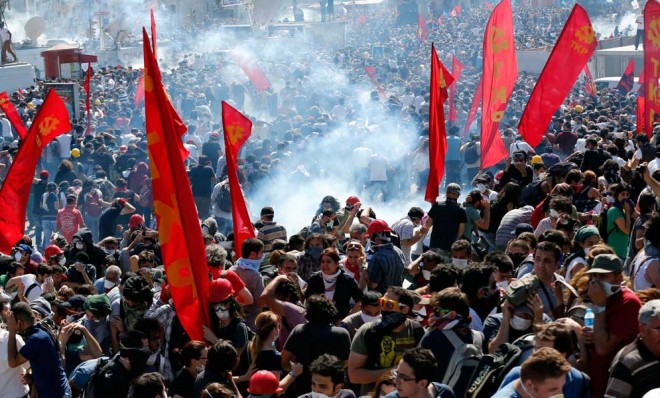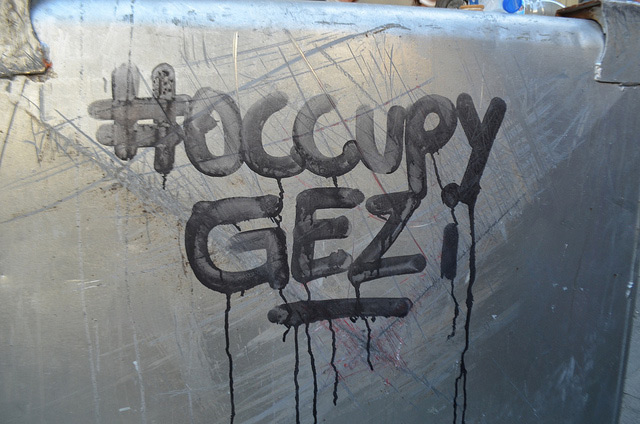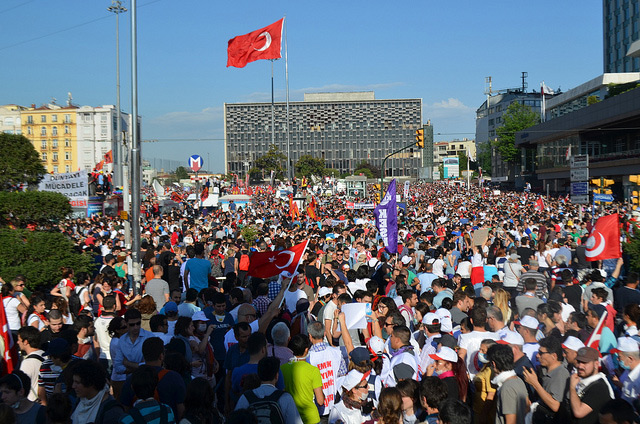Dispatch from Istanbul: Anti-government protests grow — and strengthen
What began as a demonstration against turning a park into a building has grown into a massive, wholesale rejection of Turkey's government

A free daily email with the biggest news stories of the day – and the best features from TheWeek.com
You are now subscribed
Your newsletter sign-up was successful
ISTANBUL, TURKEY — If an early victory can be claimed by protesters in this new uprising, it is that Saturday began with tear gas and heavy police confrontation and ended with Itskilal Boulevard and Taksim Square peacefully occupied without a policeman in sight.
(For more background on the movement — which originally was a protest against turning a park into a mall, but has grown to a wholesale rejection of Turkey's government — read my first dispatch here.)
Throughout the late afternoon and into the early hours of the morning, tens of thousands of people filled all streets leading to Gezi Park in Taksim Square. The park itself was relatively calm, unlike the perimeter of Taksim with its cheek-to-jowl marchers, large bonfires, and flipped-over cop cars now acting as ad hoc monuments to the young resistance. But Gezi Park is the emotional core to the protest, and it will be the place where people make their stand.
The Week
Escape your echo chamber. Get the facts behind the news, plus analysis from multiple perspectives.

Sign up for The Week's Free Newsletters
From our morning news briefing to a weekly Good News Newsletter, get the best of The Week delivered directly to your inbox.
From our morning news briefing to a weekly Good News Newsletter, get the best of The Week delivered directly to your inbox.
The crowd is admirably multicultural. Turkish flags bearing the image of founding father Atataturk are not far from Kurdish Party banners; and the most affecting for me, the familiar rainbow flag of Gay Pride marching safely and confidently through the middle of a cheering crowd.
"Today is for us too," said gay activist Tarik Arduar.
Young people are here in multitudes. Islender Demirere, 25, says that this was his first protest. He was less optimistic about regime change, but wanted the government to know that they will keep coming back and in large numbers. His perspective is one I heard echoed among Turks in their 20s, many of whom are facing to the West as they imagine the future of their country. "If the government wants to be like Europe, it also has to have the same liberties. Like gay marriage or legalized marijuana."
In many ways, Turkey is like the U.S, a diverse and culturally fractious nation. Pockets of liberalism are found amid large swaths of rural religious conservatism, PM Erdogan's main base. The largest ethnic minority are Kurds, whose long contentious relationship with the rest of Turkey includes an effort to partition.
A free daily email with the biggest news stories of the day – and the best features from TheWeek.com
Kurds were everywhere in the crowd. They sang: "Shoulder to shoulder against fascism."
When asked what this day meant for Kurdsas a historically discriminated against group, one young man said they stood with the rest of Turks in Taksim Square. Another one jumped in and said they are ready to take up arms and fight.
That was the first call to violence I heard among all the people I spoke with throughout the week.
As we walked away, my friend Peri, whose mother is Kurdish, curtly responded that most Kurds are very peaceful people.

The battle to protect freedom of speech and fight disenfranchisement are principles we can all stand behind, but from afar you might be forgiven for feeling disconnected from the internal politics or native cultural struggles of a country halfway around the world.
But the situation here in Istanbul is something we can all relate to.
The spark that lit this fire was the threat of the government ruining a small park in the middle of the city. But before that came the forced closing of a beloved movie theater, and the government's campaign against alcohol in a city fueled by late-night socializing around traditional Raki.
Yes, there are big, pressing issues like civil rights, freedom of speech, and democracy at stake, but there also the small pleasures of life that are under threat.
When I was first told that the government was taking possession of a city park and turning it into a mall, I was awfully surprised. Imagine learning one day that Union Square Park was scheduled to be torn up and replaced with a concrete mall.
The Cultural Heritage and Preservation Board is tasked with protecting Istanbul's architecture and public spaces like parks, but according to Omer Kanipak, professor of architecture at Bahcesehir University, the organization is not free of the influence of Ankara.
"The preservation board, formed by some academic people picked by the government, is the only commission that may make this legal. However the pressure of the government caused the resignation of some members and the government placed (its) own men in the commission to pass this project."
But according to Kanipak, the future of Gezi Park remains very unclear. "There is actually no defined or planned purpose of this zombie building that the government wants to resurrect. The mayor says it may be used as a cultural center and the PM says it will be a nice shopping mall or residence. There's no plan! The only intention is to erase the park and make a building!"

Here's what is clear: It's no longer just about trees. It's about regime change.
Referring to Prime Minister Erdogan, protester Sinan Sahan's sentiment was emphatic: "He's a dictator. We will stay until he leaves. He is no better than Assad. He does not listen to us."
There is no formal leadership to this movement. It is still young and coalescing, but it's becoming more organized by the day as it has matured to an occupation and not just a protest. All eyes seem to be on the prime minister as the numbers continue to grow on the streets.
Ben Pomeroy is a freelance writer whose work has appeared in Bon Appetit and HowAboutWe.com. Formerly, he co-founded and produced a web-based radio show about environmental and sustainability issues called Now or Never. Read his blog here.
-
 The environmental cost of GLP-1s
The environmental cost of GLP-1sThe explainer Producing the drugs is a dirty process
-
 Greenland’s capital becomes ground zero for the country’s diplomatic straits
Greenland’s capital becomes ground zero for the country’s diplomatic straitsIN THE SPOTLIGHT A flurry of new consular activity in Nuuk shows how important Greenland has become to Europeans’ anxiety about American imperialism
-
 ‘This is something that happens all too often’
‘This is something that happens all too often’Instant Opinion Opinion, comment and editorials of the day
-
 The billionaires’ wealth tax: a catastrophe for California?
The billionaires’ wealth tax: a catastrophe for California?Talking Point Peter Thiel and Larry Page preparing to change state residency
-
 Bari Weiss’ ‘60 Minutes’ scandal is about more than one report
Bari Weiss’ ‘60 Minutes’ scandal is about more than one reportIN THE SPOTLIGHT By blocking an approved segment on a controversial prison holding US deportees in El Salvador, the editor-in-chief of CBS News has become the main story
-
 Has Zohran Mamdani shown the Democrats how to win again?
Has Zohran Mamdani shown the Democrats how to win again?Today’s Big Question New York City mayoral election touted as victory for left-wing populists but moderate centrist wins elsewhere present more complex path for Democratic Party
-
 Millions turn out for anti-Trump ‘No Kings’ rallies
Millions turn out for anti-Trump ‘No Kings’ ralliesSpeed Read An estimated 7 million people participated, 2 million more than at the first ‘No Kings’ protest in June
-
 Ghislaine Maxwell: angling for a Trump pardon
Ghislaine Maxwell: angling for a Trump pardonTalking Point Convicted sex trafficker's testimony could shed new light on president's links to Jeffrey Epstein
-
 The last words and final moments of 40 presidents
The last words and final moments of 40 presidentsThe Explainer Some are eloquent quotes worthy of the holders of the highest office in the nation, and others... aren't
-
 The JFK files: the truth at last?
The JFK files: the truth at last?In The Spotlight More than 64,000 previously classified documents relating the 1963 assassination of John F. Kennedy have been released by the Trump administration
-
 'Seriously, not literally': how should the world take Donald Trump?
'Seriously, not literally': how should the world take Donald Trump?Today's big question White House rhetoric and reality look likely to become increasingly blurred